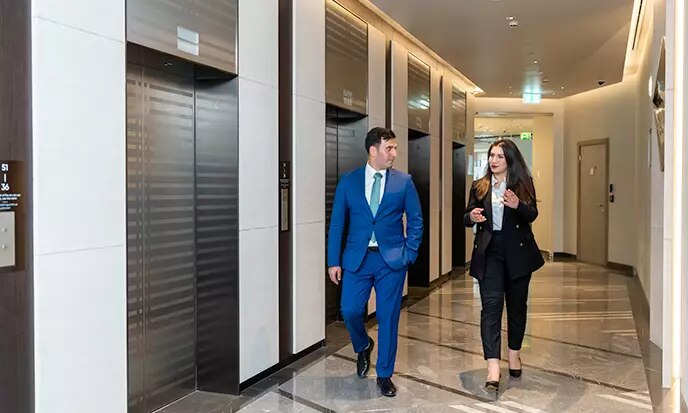Why a receptionist is not dead: The role of front desk professionals in UAE workplaces
By Perla Saba

Why receptionists still matter in business
Your most unhappy customers are your greatest source of learning.” Bill Gates
This well-known quote highlights a simple truth: business success will always come down to people. Technology has changed the way offices operate with automation, AI chatbots, and digital check-in systems, but it has not replaced the value of genuine human interaction.
Walk into any office in Dubai, Abu Dhabi, or Sharjah today and you will see it for yourself. A receptionist is still there at the front desk, greeting clients, answering calls, and making sure visitors feel at ease. No app or machine can offer the same warmth, reassurance, or attention to detail.
In the UAE, where hospitality and strong first impressions are part of everyday business culture, the role of the receptionist has only become more important. Far from fading away, receptionists have adapted to modern workplaces, taken on new responsibilities, and continue to play a key role in shaping how companies are perceived. The role has not disappeared; it has evolved, and it is more relevant than ever.
The receptionist as the face of the business
A receptionist is often the first person a client, partner, or investor meets. In the UAE’s business environment, where competition is strong, first impressions are critical. Research shows that 82% of businesses with a receptionist plan to keep the role over the next five years. The reason is simple: a receptionist can provide a warm welcome, guide visitors, and create an atmosphere that builds trust.
For small businesses, receptionists also take on important tasks beyond greeting guests. A survey found that more than half of receptionists manage diaries, book meeting rooms, and support different departments. Many also work with digital tools that make processes faster and smoother. In the UAE’s major business hubs like DIFC or ADGM, this type of support keeps operations professional and efficient.
Businesses that do not have a receptionist often rely on building security, junior staff, or digital check-in systems. Studies show that 55% of visitors are directed by security, 48% by self-service tools, and 31% by staff with other responsibilities. This can make a business look less professional and may harm credibility. For growing businesses in Dubai and Abu Dhabi, a receptionist can make the difference between winning a client or losing one, because they help establish trust from the very first interaction.
Why this matters in the UAE
Hospitality is a core part of UAE business culture. In 2023, the tourism sector contributed AED 220 billion to the national GDP, around 11.7%, and supported over 800,000 jobs, underscoring how deeply service excellence is rooted in the economy. Just as Dubai’s luxury hotels set a global standard for welcoming guests, companies here are also expected to reflect warmth, attention, and professionalism in every interaction.
First impressions are formed almost instantly. Research shows that our brains begin to judge others in as little as seven seconds. That means the person welcoming a client or visitor significantly shapes their perception of a company. In high-energy business hubs like Dubai or Abu Dhabi, even a small gesture such as a friendly smile, clear directions, or helpful words can make visitors feel seen and respected. Receptionists fulfill this role beautifully, turning a simple office visit into a meaningful experience that builds trust and strengthens business relationships.
The modern receptionist’s role
Beyond answering phones
The role of the receptionist has grown far beyond simply greeting guests or picking up calls. In today’s offices, receptionists are at the heart of daily operations and often take on a wide range of responsibilities, such as:
- Managing meeting room bookings and schedules
- Coordinating deliveries and mail
- Assisting with event planning and logistics
- Overseeing visitor access and maintaining security
In fast-paced business hubs like DIFC and Abu Dhabi Global Market (ADGM), receptionists are more than just front-desk staff. They act as coordinators and problem-solvers, stepping in to make sure everything runs smoothly and leaving visitors with a professional first impression.
Working alongside technology
Technology has not replaced receptionists; it has made their jobs even more effective. Instead of spending hours buried in paperwork, today’s receptionists use smart tools that help them work faster and smarter. Visitor management systems make check-ins seamless, booking software keeps meeting rooms organized, and integrated communication platforms allow them to connect with teams in real time.
With these tasks streamlined, receptionists can focus on what matters most: people. They have more time to greet guests warmly, assist clients with confidence, and give every visitor the personal attention that leaves a lasting impression. In many ways, technology has allowed receptionists to bring out the best of both efficiency and genuine human connection.
The human touch in a digital world
Technology may be efficient, but it cannot match human empathy. A receptionist can sense when a client appears uncertain or when an executive needs a moment of calm before an important meeting. These small, thoughtful gestures are often the ones that build trust, especially in the UAE’s multicultural business environment.
Studies show that 70% of consumers prefer human interaction for empathetic and personalized service experiences, even when technology is available. Research also highlights that the "human touch" strongly influences customer loyalty and retention.
First impressions play a major role too. Studies find that significantly shape how a company is perceived, with judgments forming within just seven seconds of arrival. In business hubs like Dubai or Abu Dhabi, that warmth and attentiveness at the front desk often makes the difference between being seen as professional and being overlooked.
Even with automation growing, one truth remains clear: empathy cannot be programmed. Technology can handle tasks, but it is the human receptionist who ensures every office visit feels welcoming and genuine.
Cost-efficiency and flexibility
For many small or growing businesses, hiring a full-time receptionist can be costly. Yet having a professional front desk presence is often essential for building trust and making the right impression. This is where flexible workspace providers such as Servcorp offer the perfect solution. At Servcorp offices in premium UAE locations like Emirates Towers and Etihad Towers, businesses gain access to professional receptionists without the cost of hiring and training them directly. The shared service model ensures companies project professionalism while remaining cost-efficient.
Discover how a Virtual Office in Dubai can provide you with a professional receptionist without the overhead. Learn more about Virtual Office solutions in Abu Dhabi
Receptionists as brand ambassadors
A receptionist is more than someone at the front desk. They are often the first person a client, partner, or investor meets, and that first interaction reflects your brand. How they greet visitors or answer calls shows what your company stands for.
In competitive UAE markets like Dubai and Abu Dhabi, receptionists make the difference between a visitor feeling valued or overlooked. They embody hospitality and competence, showing that your business is both capable and caring.
Final thoughts:
Receptionists are far from obsolete. Their role has adapted to modern business needs, blending efficiency with empathy and professionalism with hospitality. In the UAE, where relationships and reputation matter most, they remain central to workplace success. Receptionists are not just surviving in today’s business world; they are thriving and will continue to shape lasting first impressions.





